1990
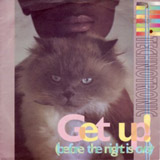 |
Get Up! (Before The Night Is Over) - Technotronic feat. Ya
Kid K
3 weeks No.1
between
week
8, 1990 and
week
10, 1990 Labels: SBK / Swanyard / BCM - Writers: Manuella Kamosi, Thomas De Quincey - Producer: Thomas De Quincey Technotronic was a hip-house project by the Belgian musician and record producer Jo Bogaert a.k.a. Thomas De Quincey. The debut single "Pump Up The Jam" was eight weeks at no.2 globally between December 1989 and February 1990. The jump at the summit was prevented by Phil Collins' "Another Day In Paradise". The follow-up "Get Up! (Before The Night Is Over)", released on January 12, 1990, made it at least 3 weeks at no.1, before Sinead O'Connor's "Nothing Compares 2 U" pushed it to the runner-up slot for another five weeks. "Get Up! (Before The Night Was Over)" is an excellent club tune with a big bass sound. It reached no.1 in Belgium and Spain, and no.2 in United Kingdom, Germany, France, the Netherlands, and Austria. In the United States it went to no.7. |
 |
Nothing Compares
2 U - Sinead O'Connor
7 weeks No.1
between
week
11, 1990 and
week
17, 1990 Label: Chrysalis - Writer: Prince - Producers: Sinead O'Connor, Nellee Hooper "Nothing Compares 2 U", released on January 8, 1990, was the lead single of Sinead's second studio album I Do Not Want What I Haven't Got. Originally the song was written and composed by Prince for his side project, The Family. But only Sinead's emotional, gutsy performance made it a classic. Painful loss meets stunning vocals beauty with a perfectly understated instrumental arrangement. A part in success had certainly the famous video-clip, directed by John Maybury. It consists mostly of a closeup on Sinead O'Connor's face as she goes through stages of sadness and anger while singing the lyrics. Toward the end of the video, two tears roll down her face. Sinead has said that her tears were real. She explained that the tears were triggered by thoughts of her mother, who died in a car accident in 1985. "Nothing Compares 2 U" climbed to number one in almost all countries and was the biggest hit of the year 1990 globally. |
 |
Vogue - Madonna
8 weeks No.1
between
week
18, 1990 and
week
25, 1990 Label: Sire - Writers: Madonna, Shep Pettibone - Producers: Madonna, Shep Pettibone "Vogue" was released on March 27, 1990 as the lead single of the soundtrack album I'm Breathless (1990). Madonna was inspired by vogue dancers and choreographers Jose Gutierez Xtravaganza and Luis Xtravaganza from the Harlem House Ball community, the origin of the dance form, and they introduced Vogueing to her at the Sound Factory club in New York City. "Vogue" is an upbeat house song which set trends in dance music in the 1990s with strong influences of 1970s disco within its composition. It also contains a spoken section, in which Madonna name-checks various golden-era Hollywood celebrities. Lyrically, the song is about enjoying oneself on the dance floor no matter who one is, and it contains a theme of escapism. "Vogue" reached the no.1 spot in the United States, United Kingdom, Canada, Australia, Italy, Spain, Portugal, Sweden, Norway, and New Zealand. At the end of the year 1990 the song landed at the runner-up slot of the Global Countdown Chart with a total of 8.575.000 points. |
 |
It Must Have Been
Love - Roxette
5 weeks No.1
between
week
26, 1990 and
week
31, 1990 Labels: Parlophone / EMI - Writer: Per Gessle - Producer: Clarence Öfwermann The original version of "It Must Have Been Love (Christmas For The Broken Hearted)" was released in December 1987. It was composed after EMI Germany asked the duo to come up with an intelligence Christmas single. It became a top five hit in Sweden, but wasn't released internationally. But then the song experienced an incarnation, a slightly edited version, omitting the Christmas references, created for the soundtrack to the 1990 film Pretty Woman, starring Richard Gere and Julia Roberts. This new version was very successful, went to number one in the United States, Canada, Australia, Spain, Switzerland, Norway, and Denmark. |
 |
Step By Step -
New Kids On The Block
1 week No.1
week
28, 1990 Label: Columbia - Writer: Maurice Starr - Producer: Maurice Starr "Step By Step" was initially recorded by one of producer Maurice Starr's other groups, The Superiors and released as a single in 1987. The new version, released on May 10, 1990, was the lead single from New Kids On The Block's fourth studio album of the same name. It became the biggest smash for the boy group and reached the top position in the United States and Canada, furthermore no.2 in United Kingdom. |
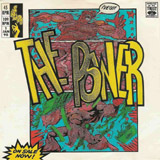 |
The Power -
Snap
1 week No.1
week
32, 1990 Labels: Logic / Arista - Writers: Benito Benites, John 'Virgo' Garrett III, Toni C. - Producers: Michael Münzing, Luca Anzilotti "The Power" was released in January 1990 as the lead single from the German Eurodance group's debut album World Power. The hypnotic dance smash with the juddering riff, a great bassline and soul-drenched female vocals contains samples from "Let The Words Flow" by Chill Rob G, "Love's Gonna Get You" by Jocelyn Brown, and "King Of The Beats" by Mantronix. "The Power" reached no.1 in United Kingdom, the Netherlands, Spain, Switzerland, and Greece, no.2 in the United States and Germany, furthermore no.3 in Italy, Sweden, Norway, Finland, Belgium, and Austria. On the Year-End Chart 1990 'The Power' listed at no.3 with 7,643,000 points. |
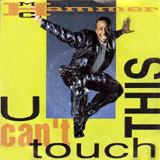 |
U Can't Touch
This -
MC Hammer
1 week No.1
week
33, 1990 Label: Capitol - Writers: Stanley Burrell, Rick James, Alonzo Miller - Producer: MC Hammer "U Can't Touch This", released on December 29, 1989, is considered to be MC Hammer's signature song and is his most successful single. Along with Hammer, Rick James shares songwriting credits with Alonzo Miller because the song samples the prominent opening riff of "Super Freak". It has been used or referenced in television shows, films, commercials and other forms of media. It has also received awards and recognitions. The song is notable as the winner of the Best R&B Song and a Best Rap Solo Performance and the first rap song to be nominated for Record Of The Year at the 33rd Annual Grammy Awards in 1991. "U Can't Touch This" was a no.1 smash in Australia, Belgium, the Netherlands, and Sweden, and it went to no.2 in Germany, Spain, Switzerland, and Finland. In the United States it reached no.8 and in United Kingdom no.3. |
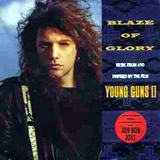 |
Blaze Of Glory -
Jon Bon Jovi
5 weeks No.1
between
week
34, 1990 and
week
38, 1990 Labels: Vertigo / Mercury - Writer: Jon Bon Jovi - Producers: Danny Kortchmar, Jon Bon Jovi "Blaze Of Glory", released on July 21, 1990, is the debut solo single by Jon Bon Jovi. The power ballad was allegedly recorded by Jon Bon Jovi because Emilio Estevez requested Bon Jovi's song "Wanted Dead Or Alive" for the soundtrack to Young Guns II, but Bon Jovi did not think the lyrics - about the band constantly touring - fit the theme of the Western movie. However, the request inspired him to write "Blaze Of Glory" with lyrics more topical to the film. It registered a no.1 song in the United States, Canada, Australia, and New Zealand. |
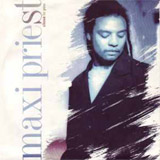 |
Close To You -
Maxi Priest
2 weeks No.1
between
week
39, 1990 and
week 40, 1990 Labels: Charisma / Virgin - Writers: Maxi Priest, Gary Benson, Winston Sela - Producers: Handel Tucker, Geoffrey Chung, Lowell 'Sly' Dunbar "Close To You" was released on July 8, 1990 as the lead single from the British reggae vocalist Maxi Priest's fifth album Bonafide (1990). It's a typical song of the new jack swing genre, a digital go-go music created by Teddy Riley that was popular from the late-1980s to early 1990s. "Close To You" went to no.1 in the United States and reached the runner-up slot in Australia, New Zealand, Sweden, and Greece. |
 |
Praying For Time -
George Michael
3 weeks No.1
between
week 41, 1990 and
week 43, 1990 Labels: Epic / Columbia - Writer: George Michael - Producer: George Michael "Praying For Time" was released on August 13, 1990 as the lead single from the album Listen Without Prejudice Vol.1 (1990). The melancholy song is a dark and sombre reflection on social ills and injustice, it was hailed by critics, with James Hunter of Rolling Stone magazine describing the song as a distraught look at world's astounding woundedness. Michael offers the healing passage of time as the only balm for physical and emotional hunger, poverty, hypocrisy and hatred. While Michael refused to appear in videos to support the album, an experimental video clip directed by Michael Borofsky was released, featuring only the lyrics of the song with a blue and blackgound that, at the end of the clip, reveals itself to be the image on the cover of the album. "Praying For Time" went in the top 10 of many countries, in the United States and Canada it reached even the number one position. |
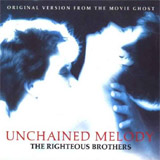 |
Unchained Melody -
Righteous Brothers
2 weeks No.1
between
week 44, 1990 and
week 45, 1990 Label: Verve - Writers: Alex North, Hy Zaret - Producer: Bill Medley "Unchained Melody" was originally written in 1955 as the theme for the little-known prison film 'Unchained'. It has since become a standard and one of the most recorded songs of the 20th century, most notably by the Righteous Brothers. Their version was released 1965 and peaked at no.5 globally in September of that year. It was re-released in 1990 after the Righteous Brothers' recording was used in the box office blockbuster film "Ghost", starring Patrick Swayze, Demi Moore, and Whoopi Goldberg. Consequently the epic hymn reached the no.1 spot in United Kingdom, Australia, the Netherlands, Austria, New Zealand, and Ireland. |
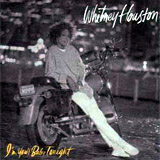 |
I'm Your Baby
Tonight -
Whitney Houston
2 weeks No.1
between
week 46, 1990 and
week 47, 1990 Label: Arista - Writers: Kenneth Edmonds, Antonio Reid - Producer: L.A.Reid, Babyface "I'm Your Baby Tonight" was released on October 2, 1990 as the lead single from Whitney's third studio album of the same name. While the original version, produced by L.A.Reid and Babyface, was published in the United States, the Yvonne Turner mix (also known as the 'International Version'), was published in other countries. The song topped the hitlists in the United States, Italy, Portugal, and Greece. Furthermore it went to the runner-up slot in Canada, Belgium, the Netherlands, and Finland. |
 |
Ice Ice Baby -
Vanilla Ice
5 weeks No.1
between
week 48, 1990 and
week 52, 1990 Label: SBK - Writers: Floyd Brown, Mario Johnson, Robert Van Winkle - Producer: Vanilla Ice "Ice Ice Baby" was first released on August 22, 1990 as the B-side to Vanilla Ice's cover of "Play That Funky Music", but the single was not initially successful. When disc jockey David Morales played "Ice Ice Baby" instead, it began to gain success. Robert Van Winkle, better known by his stage name Vanilla Ice, wrote "Ice Ice Baby" in 1983 at the age of 16, basing its lyrics upon his experiences in South Florida. The lyrics describe a shooting and Van Winkle's rhyming skills. The chorus originates from the signature chant of the national African American fraternity Alpha Phi Alpha. And of course the song's hook samples the striking bassline of the 1981 song "Under Pressure" by Queen and David Bowie. "Ice Ice Baby" was the first hip hop single to top the Billboard Hot 100. Outside the United States, the song reigned the charts in United Kingdom, Australia, Belgium, the Netherlands, New Zealand, and Ireland. |
1991
 |
Justify My Love -
Madonna
2 weeks No.1
between
week 1, 1991 and
week 2, 1991 Label: Sire - Writers: Lenny Kravitz, Ingrid Chavez, Madonna - Producers: Lenny Kravitz, André Betts "Justify My Love" was released on November 6, 1990 as the lead single from Madonna's first greatest hits compilation album The Immaculate Collection (1990). Musically it's a trip hop song with mid-tempo settings and instrumentation. Producer Kravitz used striking drums, found on Public Enemy's instrumental "Security Of The First World" (1988). The lyrics of the song are primarily about sex and romance. Madonna's vocals are primarily spoken and whispered, but almost never sung, a style that she later employed on her following studio album Erotica (1992). The famous music video for "Justify My Love" was directed in Paris on November 9, 1990, by Jean-Baptiste Mondino, features Madonna's then-boyfriend, model and actor Tony Ward. It caused controversy worldwide, due to its explicit sexual images of sadomasochism, voyerism, and bisexuality, and was subsequently banned from MTV and other TV networks. "Justify My Love" went to the top position in the United States, Canada, Finland and to the runner-up slot in United Kingdom and Italy. |
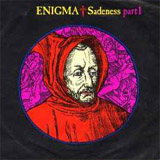 |
Sadeness Part 1 -
Enigma
7 weeks No.1
between
week 3, 1991 and
week 13, 1991 Labels: Charisma / Virgin - Writers: Michael Cretu, Fabrice Cuitad, Frank Peterson - Producer: Michael Cretu A mystical sound reverberated through the charts in the early nineties of the 20th century: shimmering, atmospheric synth and flute lines, traditional Gregorian chants within the context of orgasmic groaning and a tribal hip-hop groove. The unusual mixture was the idea of German musician and producer Michael Cretu. "Sadeness Part 1", released on October 28, 1990, was the debut work of his project Enigma and the lead single of the album MCMXC a.D. (1990). The Gregorian vocals mostly taken from the 1976 album Paschale Mysterium by the German choir Capella Antiqua and the French lyrics whispered by Cretu's then-wife Sandra, who at the time of Enigma's formation had already hit singles as a solo artist. Despite the record company Virgin had done virtually no promotion on the song, "Sadeness Part 1" reached no.1 in Germany shortly after its release. Sales took off purely on the strength of radio and club play. A little later the song also made it to the top in United Kingdom, France, Italy, Spain, Portugal, the Netherlands, Belgium, Sweden, Norway, Austria, Switzerland, Ireland, and Greece. |
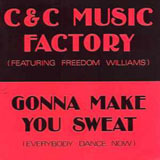 |
Gonna Make You
Sweat - C & C Music Factory feat. Freedom Williams
3 weeks No.1
between
week 7, 1991 and
week 10, 1991 Labels: CBS / Columbia - Writers: Robert Clivillés, Fredrick B.Williams - Producers: Robert Clivillés, David Cole "Gonna Make You Sweat", released on November 18, 1990, was originally wrote and produced by Robert Clivillés as an instrumental track. He offered the track to vocal trio Trilogy, but when they declined to record it, Clivillés decided to use the track for his and David Cole's C & C Music Factory. The rap verse was performed by Freedom Williams and the female vocals by Martha Wash. The video for the song was directed by German director Marcus Nispel and featured dancers performing in front of a white back drop. Singer / songwriter Zelma Davis lip-syncs to the recorded vocals of Martha Wash. "Gonna Make You Sweat" went to the top position in the United States, Germany, the Netherlands, Switzerland and Austria. |
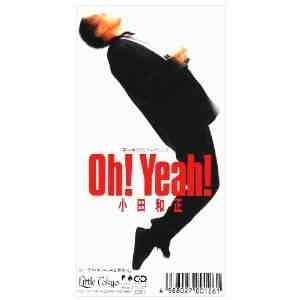 |
Oh! Yeah! -
Kazumasa Oda
1 week No.1
week
8, 1991 Label: Funhouse - Writer: Kazumasa Oda - Producer: Kazumasa Oda "Oh! Yeah!" was released in January 2001 as a double A-side single. Both songs were written and produced by Kazumasa Oda himself: the title-song was used as the background music on TV advertisement of the Dai-ichi Mutual Life Insurance Company. The other song, 'Love Story Wa Totsuzen Ni', was featured as theme song for Tokyo Love Story, the drama series which was broadcast by Fuji Television. With more than 2,5 million sales it became the best-selling single of 1991 in Japan. |
 |
Joyride - Roxette
9 weeks No.1
between
week 14, 1991 and
week 22, 1991 Label: EMI - Writer: Per Gessle - Producer: Clarence Öfwerman "Joyride", released on February 27, 1991, was the lead single from the Swedish pop duo's third studio album with the same title. Per Gessle has said that the opening line of the song was inspired by a note his back then girlfriend left on his piano, which read: 'Hej, din tok, jag älskar dig' ('Hello, you fool, i love you'). Its title was derived from an interview in which Paul McCartney compared writing songs with John Lennon to 'a long joyride'. The feelgood tune went to the top position in the United States, Germany, Australia, Canada, the Netherlands, Belgium, Austria, Switzerland, Sweden, Norway, Denmark, and Spain. |
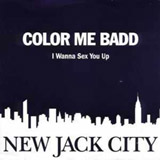 |
I Wanna Sex You
Up - Color Me Badd
5 weeks No.1
between
week 23, 1991 and
week 27, 1991 Labels: Giant / Reprise - Writers: Elliot Straite, Color Me Badd - Producer: Dr.Freeze "I Wanna Sex You Up" was released on March 2, 1991 as the lead single from the band's debut album C.M.B. (1991). The song was also featured on the soundtrack to the 1991 film "New Jack City". The 'to the tick tock ya don't stop' soundbite is sampled from Slick Rick's "La Di Da Di". The bassline, chord structure and the 'i know you not gonna sing that song!' soundbite are sampled from Betty Wright's "Tonight Is The Night". The chorus melody is from the Shuggie Otis song "Strawberry Letter 23". The catchy and sunny tune topped the hitlists in United Kingdom and New Zealand. In the United States and the Netherlands it reached no.2. |
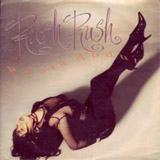 |
Rush Rush - Paula
Abdul
1 week No.1
week
28, 1991 Label: Virgin - Writer: Peter Lord - Producers: Peter Lord, Vernon Jeffrey Smith "Rush Rush", released on May 2,1991, was the lead single from Paula's second studio album Spellbound (1991). The song was a departure for Abdul stylistically, as it was her first ballad released as a single, following as it did the six uptempo singles from her debut album, and was viewed by all observers as a rather risky strategy in kicking off her second album of new material Spellbound. But the decision was vindicated, as it was very well received at retail. "Rush Rush" reached no.1 in the United States and Canada. |
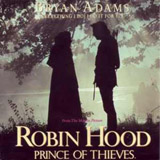 |
(Everything I Do)
I Do It For You - Bryan Adams
19 weeks No.1
between
week 29, 1991 and
week 47, 1991 Label: A&M - Writers: Bryan Adams, Michael Kamen, Robert 'Mutt' Lange - Producer: Robert 'Mutt' Lange "(Everything I Do) I Do It For You" was released on June 18, 1991. The power ballad was featured on two albums, firstly the soundtrack album from the 1991 film Robin Hood: Prince Of Thieves and then on Adams' sixth album, Waking Up The Neighbours (1991). The musicians on the original recording are Adams on the lead vocals, backing vocals and rhythm guitar, Bill Payne (piano), Mickey Curry (drums), Larry Klein (bass), Keith Scott (lead guitar and backing vocals), and Mutt Lange (synthesizers). Based on orchestral music by Michael Kamen, the song was written in London, at the studio Adams working at in 1990, and he and Lange wrote it in 45 minutes. "(Everything I Do) I Do It For You" was an enormous chart success internationally, reaching the number-one positions in almost all countries, inter alia 17 weeks in the United States (sales-only chart) and 16 weeks in United Kingdom. On the Year-End Chart 1991 the song was the clear winner with massive 15.694.000 points. |
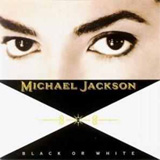 |
Black Or White -
Michael Jackson
10 weeks No.1
between
week 48, 1991 and
week 5, 1992 Label: Epic - Writers: Michael Jackson, Bill Bottrell - Producers: Michael Jackson, Bill Bottrell "Black Or White", released on November 11, 1991, was picked as the first single from Jackson's eighth studio album Dangerous (1991). The song has elements of dance, hip hop and hard rock music such as Bill Bottrell's guitars and Jackson's vocal style. Epic Records described the song as 'a rock'n'roll dance song about racial harmony'. The spectacular accompanying video clip, directed by John Landis, became famous for its morphing visual effects, created by Pacific Data Images. This technique had been previously used only in movies such as Willow and Terminator 2: Judgement Day. 'Black Or White' topped the hitlists in many countries, like the United States, United Kingdom, France, Canada, Australia, Italy, Spain, Belgium, the Netherlands, Austria, Switzerland, Sweden, Norway, Finland, Denmark, Greece, Ireland, and New Zealand. |
1992
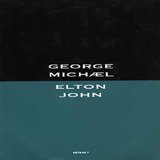 |
Don't Let The Sun
Go Down On Me - George Michael & Elton John
5 weeks No.1
between
week 6, 1992 and
week 10, 1992 Labels: Epic / Columbia - Writers: Elton John, Bernie Taupin - Producers: George Michael "Don't Let The Sun Go Down On Me" was originally released by Elton John and peaked at no.6 in July 1974. George Michael performed the song for the first time at the legendary Live Aid concert in 1985, while Elton John playing the piano. Six years later, George Michael's Cover To Cover tour regularly included the song, and for the final show at Wembley Arena, London on 23 March 1991, Michael brought out John as a surprise guest to sing it with him. This recording was released as a single on November 25 in that year and reached the number one position in the United States, United Kingdom, France, Canada, Italy, the Netherlands, Belgium, Norway, and Switzerland. |
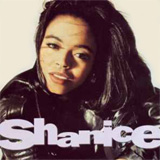 |
I Love Your Smile
- Shanice
2 weeks No.1
between
week 11, 1992 and
week 12, 1992 Label: Motown - Writers: Jarvis La Rue Baker, Sylvester Jackson, Narada Michael Walden, Shanice Walden - Producer: Narada Michael Walden The good-mood smash "I Love Your Smile" was released on October 22, 1991 as the lead single from Shanice's second studio album, Inner Child (1991). The track features a saxophone solo by Brandon Marsalis as well as laughter from Janet Jackson and René Elizondo Jr. near the end of the song. "I Love Your Smile" topped only the hitlist in the Netherlands, but went to the runner-up slot in the United States, United Kingdom, Germany, and Norway. |
 |
Remember The Time -
Michael Jackson
2 weeks No.1
between
week 13, 1992 and
week 14, 1992 Label: Epic - Writers: Teddy Riley, Michael Jackson, Bernard Belle - Producers: Michael Jackson, Teddy Riley "Remember The Time" was released on January 14, 1992 as the second single from Jackson's eighth studio album Dangerous (1991). It's a R&B song fused with new jack swing and the lyrics recall a youthful love affair. The accompanying music video for "Remember The Time", directed by John Singleton, was filmed at the Hollywood Universal Studios. It was set in ancient Egypt and featured groudbreaking visual effects and appearances by Eddie Murphy, Iman, The Pharcyde, Magic Johnson, Tom Lister Jr. and Wylie Draper. The song reached the no.1 position in Belgium and New Zealand, in the United States and United Kingdom it peaked at no.3. |
 |
To Be With You -
Mr.Big
5 weeks No.1
between
week 15, 1992 and
week 19, 1992 Label: Atlantic - Writers: Eric Martin, David Grahame - Producer: Kevin Elson The soft-rock ballad "To Be With You" was released on November 25, 1991 as the second single from the band's second studio album Lean Into It (1991). It was written and composed by frontman Eric Martin during his teen years, with guitarist Paul Gilbert contributing to its melodic arrangements later on. The lyrics were inspired by a girl Martin knew when he was younger: "This girl had a lot of boyfriends, who treated her like shit. I wanted to be the knight in shining armor, wanted to be with her. She wasn't having it. It never came to play". "To Be With You" topped the hitlists in the United States, Germany, Canada, Australia, Belgium, the Netherlands, Austria, Switzerland, Sweden, Norway, Denmark and New Zealand. |
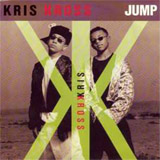 |
Jump - Kris Kross
8 weeks No.1
between
week 20, 1992 and
week 29, 1992 Label: Columbia - Writers: Jermaine Dupri, Joe Nicolo, Alphonso Mizell, Berry Gordy, Deke Richards, Freddie Perren - Producers: Jermaine Dupri, Joe Nicolo "Jump", released on February 6, 1992, as their first single from their debut studio album Totally Krossed Out (1992). Chris 'Mac Daddy' Kelly and Chris 'Daddy Mac' Smith were only 12 and 13 years old when they recorded the song. The furious hip-hop smash samples "I Want You Back" by the Jackson 5, "Funky Worm" by Ohio Players, "Impeach The President" by the Honey Drippers, "How I Could Just Kill A Man" by Cypress Hill, "Escape-Ism" by James Brown, "Saturday Night" by Schoolly D, and a replay of "O.P.P." by Naughty By Nature. "Jump" jumps atop the hitlists in the United States, Australia, Switzerland, New Zealand, Ireland, and went to the runner-up slot in United Kingdom, Germany, the Netherlands, Sweden, Norway, and Denmark. |
 |
Kimi Ga Irudakede -
Kome Kome Club
1 week No.1
week
21, 1992 Label: Sony Music Japan - Writer: Kome Kome Club - Producer: Kome Kome Club Released on May 4, 1992, "Kimi Ga Irudakede" sold massive 924,780 copies in its inital week, according to Oricon. The song held the top rank in total of six weeks in Japan. It sold nearly 3 million copies totally and is the top-selling J-pop single of the 1990s. |
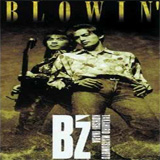 |
Blowin' - B'z
1 week No.1
week
24, 1992 Label: BMG Rooms Records Japan - Writers: Koshi Inaba, Tak Matsumoto - Producer: Tak Matsumoto "Blowin" is the tenth single by B'z, released on May 27, 1992. The song is one of the duo's many number-one singles in Japan, selling over 500,000 copies in its first week and a total over 1,6 million copies in 1992 according to Oricon. |
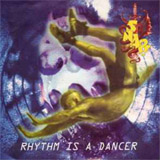 |
Rhythm Is A
Dancer - Snap
8 weeks No.1
between
week 30, 1992 and
week 40, 1992 Labels: Logic / Arista - Writers: Benito Benites, John 'Virgo' Garrett III, Thea Austin, Toni C. - Producers: Benito Benites, John 'Virgo' Garrett III "Rhythm Is A Dancer" was released on March 30, 1992 as the second single from their second studio album, The Madman's Return (1992). Originally it was not planned to be released as a single. Good club reactions to the track, however, made Snap's German label, Logic, change their minds. The song was written and produced by Benito Benites and John 'Virgo' Garrett III, aliases for German producers Michael Münzing and Luca Anzilotti, the founders of the German Eurodance act Snap. "Rhythm Is A Dancer" contains the hook / riff sample from the 1984 song "Automan" by Newcleus. The accompanying music video, directed by British director Howard Greenhalgh, was filmed at the Kennedy Space Center Visitor Complex in Florida. "Rhythm Is A Dancer" is the most successful song of 1992, led the Year-End Chart with 11,615,000 points and topped the charts in many countries around the world. |
 |
This Used To Be
My Playground
- Madonna
3 weeks No.1
between
week 31, 1992 and
week 33, 1992 Label: Sire - Writers: Madonna, Shep Pettibone - Producers: Madonna, Shep Pettibone "This Used To Be My Playground", released as a standalone single on June 16, 1992, is the theme for the film A League Of Their Own, which starred Madonna, and portrayed a fictionalized account of the real-life All-American Girls Professional Baseball League. However, it was not available on the film's soundtrack due to contractual obligations and was later added to the Olympics-inspired Barcelona Gold compilation album (1992) and Madonna's ballads compilation Something To Remember (1995). "This Used To Be My Playground" went to no.1 in the United States, Canada, Italy, Sweden, and Finland. |
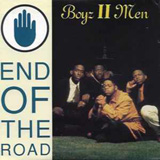 |
End Of The Road
- Boyz II Men
7 weeks No.1
between
week 41, 1992 and
week 48, 1992 Label: Motown - Writers: Kenneth Edmonds, Antonio Reid, Daryl Simmons - Producers: Kenneth Edmonds, Antonio Reid, Daryl Simmons "End Of The Road" was released on June 30, 1992 as the lead single from the soundtrack to the romantic comedy film Boomerang, starring Eddie Murphy, Grace Jones, Halle Berry, and Chris Rock. The doo-wop / R&B ballad led the Billboard Hot 100 for massive 13 weeks. Furthermore it reached the top position in United Kingdom, Australia, the Netherlands, New Zealand, and Ireland. On the Year-End Chart it placed at the runner-up slot behind Snap's "Rhythm Is A Dancer". |
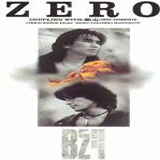 |
Zero - B'z
1 week No.1
week
43, 1992 Label: BMG Rooms Records Japan - Writers: Koshi Inaba, Tak Matsumoto - Producer: Tak Matsumoto "Zero" is the eleventh single by B'z, released on October 7, 1992, and the only one from their album Run (1992). The song shoots at number one with over 600,000 selling copies in its initial week, according to Oricon. |
 |
I Will Always
Love You
- Whitney Houston
17 weeks No.1
between
week 49, 1992 and
week 13, 1993 Label: Arista - Writer: Dolly Parton - Producer: David Foster "I Will Always Love You" was written and originally recorded in 1973 by American singer / songwriter legend Dolly Parton. Written as a farewell to her business partner and mentor Porter Wagoner, expressing Parton's decision to pursue a solo career. In 1992, Whitney Houston recorded a new arrangement of the song for the soundtrack to the blockbuster "Bodyguard", her film debut. It was her co-star Kevin Costner who suggested "I Will Always Love You". Producer David Foster and Whitney Houston re-arranged the song as a soul ballad. Her record company did not feel a song with an a-cappella introduction would be as successful; however, Houston and Costner insisted on retaining it. Perfect! The song became one of the biggest hits in history with a total of 16,547,000 points. "I Will Always Love You" topped the hitlists in almost all countries around the world and also the 1993 year-end list. |
1993
 |
Informer
- Snow
8 weeks No.1
between
week 14, 1993 and
week 21, 1993 Label: East West - Writers: Edmond Leary, Darrin O'Brien, Shawn Moltke, Terri Moltke, Jeffrey Silva - Producer: MC Shan "Informer" was released on August 20, 1992 as first single from the Canadian musician's debut album, 12 Inches Of Snow (1993). The reggae / hip-hop / dancehall tune is well known for the line "a licky boom boom down" and for Snow's fast toasting and often unintelligible lyrics. The song based on a seperate 1989 incident when Snow was charged with two counts of attempted murder. At the time, he was detained for a year in Toronto before the charges were reduced to aggravated assault, and he was eventually acquitted and freed. "Informer" topped the hitlists in United States, Germany, Australia, Switzerland, Sweden, Norway, Finland, Denmark, Ireland, and New Zealand. |
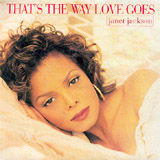 |
That's The Way
Love Goes - Janet Jackson
4 weeks No.1
between
week 22, 1993 and
week 26, 1993 Label: Virgin - Writers: Janet Jackson, James Harris III, Terry Lewis - Producers: Jimmy Jam, Terry Lewis, Janet Jackson "That's The Way Love Goes" is the lead single from Janet's fifth album, Janet (1993) and was released on April 20, 1993. The song's themes of romantic lust saw Jackson transitioning to sensual territory, considered a shocking contrast to her previous releases among critics and the public. The tunes slow tempo fused R&B, pop, funk and soul music with flourishes of downtempo and hip hop music. It went to the top position in the United States, Canada, Australia, and New Zealand. |
 |
Hadashi No Megami - B'z
1 week No.1
week
25, 1993 Label: Rooms Records Japan - Writers: Koshi Inaba, Tak Matsumoto - Producer: Tak Matsumoto "Hadashi No Megami" is the thirteenth single release of the Japanese hard rock duo and appeared in stores at June 2, 1993. According to Oricon the song sold massive 778,000 singles in its initial week and was later certified quadruple platinum by the RIAJ after a total of 1,6 million sales. |
 |
(I Can't Help)
Falling In Love With You - UB 40
12 weeks No.1
between
week 27, 1993 and
week 38, 1993 Label: Virgin - Writers: Hugo Peretti, Luigi Creatore, George David Weiss - Producer: UB 40 Originally "Can't Help Falling In Love" was a number one smash for Elvis Presley in February / March 1962. The melody is based on "Plaisir D'Amour", a popular French love song composed in 1784 by Jean-Paul-Égide Martini. UB 40's cover version, released on May 10, 1993, was the one of the biggest hits in that year globally and the biggest success for the British reggae band. "(I Can't Help) Falling In Love With You" reached the number one position in the United States, United Kingdom, Canada, Australia, the Netherlands, Belgium, Sweden, Finland, Denmark, Austria, and New Zealand. On the Year-End Chart 1993 it ranked at no.2 with 10,353,000 points. |
 |
What's Up? - 4
Non Blondes
3 weeks No.1
between
week 39, 1993 and
week 41, 1993 Label: Interscope - Writer: Linda Perry - Producer: David Tickle "What's Up?" had its origins well before 4 Non Blondes were formed. Third Eye Blind frontman Stephan Jenkins recalled sitting in a room with Linda Perry, who worked as a waitress down the street, performing their original compositions to one another when the two were struggling musicians in San Fransisco. The two played each other early versions of "Semi-Charmed Life" and "What's Up?", both of which would become big hits for their respective bands. Larry Flick from Billboard wrote about "What's Up?" that 'gymnastic vocals, leaping from a breathy, high range, to gravelly, bar-rock blues in a single passage, front this straightforward, heartfelt rocker'. Released on June 11, 1993 as the second single from the band's debut album, Bigger, Better, Faster, More (1992) it topped the hitlists in Germany, the Netherlands, Belgium, Switzerland, Austria, Sweden, Norway, Denmark, and Ireland. |
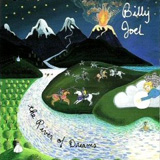 |
The River Of
Dreams - Billy Joel
1 week No.1
week
42, 1993 Label: Columbia - Writer: Billy Joel - Producers: Joe Nicolo, Danny Kortchmar "The River Of Dreams" was released on July 19, 1993 as the title track and first single from Joel's 12th studio album River Of Dreams (1993). The song borrows from the traditions of black gospel music and spirituals. The production includes a gospel choir and the lyrics deal with inner peace and the afterlife: "Not sure about a life this. God knows I've never been a spiritual man." The song reaches only in Australia and New Zealand the no.1 spot, furthermore no.2 in Canada, Austria, Switzerland, Ireland, and no.3 in the United States and United Kingdom. |
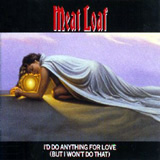 |
I'd Do Anything
For Love (But I Won't Do That) - Meat Loaf
10 weeks No.1
between
week 43, 1993 and
week 52, 1993 Labels: Virgin / MCA - Writer: Jim Steinman - Producer: Jim Steinman "I'd Do Anything For Love (But I Won't Do That)" was released on August 30, 1993, as the first single from Meat Loaf's sixth album Bat Out Of Hell II: Back Into Hell (1993). The female voice in that extravagantly produced power ballad comes from Lorraine Crosby. The accompanying music video was directed by Michael Bay and is based on Beauty & The Beast and Phantom Of The Opera. "I'd Do Anything For Love (But I Won't Do That)" reached no.3 on the Year-End Chart 1993 with no.1 placements in almost all countries around the world and it earned Meat Loaf a Grammy Award for Best Rock Vocal Performance. |
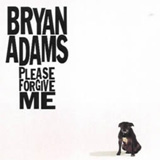 |
Please Forgive Me
- Bryan Adams
4 weeks No.1
between
week 53, 1993 and
week 3, 1994 Label: A&M - Writers: Bryan Adams, Robert 'Mutt' Lange - Producers: Bryan Adams, Robert 'Mutt' Lange "Please Forgive Me" was released on October 15, 1993 as the only single and bonus track from Adams' first greatest hits compilation, So Far So Good (1993). Larry Flick from Billboard felt that the song 'casts him in a familiar role: mournful romantic', and stated that the 'guitar-framed rock ballad is an easy smash, thanks to Adams' friendly, world-weatheredrasp, and an infectious chorus'. The accompanying music video was filmed in a recording studio and features Adams, his band and a dog. Adams and his bandmates befriended the dog - who belonged to the studio owner - whilst recording the track. "Please Forgive Me" topped the charts in France, Canada, Australia, Belgium, Norway, Portugal, and Ireland. |
1994
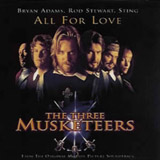 |
All For Love
- Bryan Adams / Rod Stewart / Sting
5 weeks No.1
between
week 4, 1994 and
week 9, 1994 Label: A&M - Writers: Bryan Adams, Robert 'Mutt' Lange, Michael Kamen - Producers: Chris Thomas, David Nicholas, Bryan Adams The power ballad "All For Love" was released on November 16, 1993 as the lead single for the soundtrack to the 1993 action-adventure comedy film 'The Three Musketeers'. The title was inspired by The Three Musketeers' motto: 'All for one, and one for all'. The song climbed to the top position in the United States, Germany, Canada, Australia, Italy, Switzerland, Austria, Belgium, Sweden, Norway, Denmark, Finland, and Ireland. |
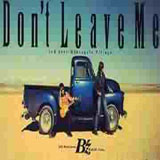 |
Don't Leave Me - B'z
1 week No.1
week
8, 1994 Label: Rooms Records Japan - Writers: Koshi Inaba, Tak Matsumoto - Producer: Tak Matsumoto "Don't Leave Me", the 14th single release by the Japanese rock-duo B'z, was released on February 9, 1994 and sold around 800,000 copies in its initial week, according to Oricon. The song was used as the drama Shin Kûkô Monogatari's theme song. |
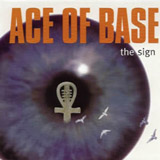 |
The Sign
- Ace Of Base
4 weeks No.1
between
week 10, 1994 and
week 13, 1994 Labels: London / Arista - Writer: Jonas Berggren - Producers: Jonas Berggren, Denniz Pop, Douglas Carr The techno-reggae, Europop smash was released on November 1, 1993. Lyrically it describes a couple contemplating the state of their relationship and deciding to split up as a result. The accompanying music video for "The Sign" is directed by Mathias Julien and was shot on Filmhuset in Stockholm in November 1993. The opening of the video is a homage to Depeche Mode's 1990 song "Enjoy The Silence". It features the Ace Of Base members singing amidst romantic and joyful images. "The Sign" went to no.1 in the United States, Germany, Canada, Australia, Spain, Denmark, Finland, New Zealand, and reached the runner-up slot of the Global Year-End Chart 1994 with 10,371,000 points. |
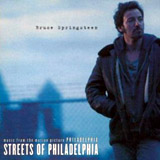 |
Streets Of
Philadelphia
- Bruce Springsteen
7 weeks No.1
between
week 14, 1994 and
week 20, 1994 Label: Columbia - Writer: Bruce Springsteen - Producers: Bruce Springsteen, Chuck Plotkin "Streets Of Philadelphia" was released on February 2, 1994 for the 1993 American legal drama film Philadelphia, starring Tom Hanks, an early mainstream film dealing with HIV / AIDS. Philadelphia director Jonathan Demme asked Springsteen to write a song for his fim. In late August 1993, after the conclusion of the "Other Band" tour, he recorded a demo of his completed song at Thrill Hill Recording, Beverly Hills, California (his home studio), supplying all of the instrumentation. He mailed the tape to Demme, who later said, "my wife and I sat down and listened to it, and we were literally weeping by the end". "Streets Of Philadelphia" reached the top position in Germany, France, Italy, Norway, Austria, Ireland, and won four Grammy Awards: Song of the Year, Best Rock Song, Best Rock Vocal Performance, Solo, and Best Song Written Specifically for a Motion Picture or Television. |
 |
The Most
Beautiful Girl In The World - Prince (Symbol)
5 weeks No.1
between
week 21, 1994 and
week 25, 1994 Labels: NPG / Bellmark - Writer: Prince - Producers: Prince, Ricky Peterson "The Most Beautiful Girl In The World" is a slow-grooving ballad that serenades a beautiful woman, his soon-to-be fiancée, Mayte Garcia. The song was played during the Miss USA pageant in 1994, but not in full. It was widely advertised in news and trade magazines that a new song from Prince would be premiered at the pageant. The ads had Prince sitting in a chair with a hat pulled down over his face, and Garcia standing next to his chair. "The Most Beautiful Girl In The World" was released on February 24, 1994, and landed at the summit in United Kingdom, Australia, the Netherlands, Spain, Switzerland, Denmark, and New Zealand, in the United States it peaked at no.3. |
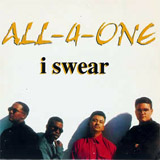 |
I Swear -
All-4-One
12 weeks No.1
between
week 26, 1994 and
week 37, 1994 Label: Atlantic - Writers: Gary Baker, Frank J. Myers - Producer: David Foster Originally "I Swear" became a hit for country music artist John Michael Montgomery. The song is a power ballad in which the narrator promises his significant other that he will always love her. It reached no.42 in March 1994 in the United States. A few weeks later, on April 28, a cover by the American male R&B and pop group All-4-One was released. This version became a huge success globally with no.1 positions in the United States, Germany, Canada, Australia, the Netherlands, Sweden, Denmark, Switzerland, Austria, and New Zealand. In United Kingdom and France it peaked at no.2. "I Swear" was the biggest hit of the year 1994 with a total of 10,872,000 points. |
 |
I'll Make Love To
You - Boyz II Men
6 weeks No.1
between
week 38, 1994 and
week 43, 1994 Label: Motown - Writer: Babyface - Producer: Babyface "I'll Make Love To You" was released on July 26, 1994 as the lead single from the band's second album II (1994). The sweeping pop / R&B ballad was a massive commercial success in the United States and held the number one position on the Billboard Hot 100 for 14 weeks. Furthermore it reached the summit in Canada, Australia, and New Zealand. "I'll Make Love To You" won the 1995 Grammy Award for Best R&B Performance by a Duo or Group with Vocals. |
 |
Always - Bon Jovi
13 weeks No.1
between
week 44, 1994 and
week 5, 1995 Labels: Jambco / Mercury - Writer: Jon Bon Jovi - Producer: Peter Collins "Always" was originally written by Jon Bon Jovi for the soundtrack to the 1993 film 'Romeo Is Bleeding', starring Gary Oldman as a corrupt cop and Mafia aide who is renounced by his wife. After being unimpressed by a preview screening of the movie - which was a critical and box office flop - he decided not to lend the song to the producers and left the track on his shelf and forgot about it until John Kalodner, a friend and A&R executive, found it and convinced him to re-record the song. Released on September 12, 1994, the power ballad became the band's biggest success and landed in the Top 10 of almost all countries around the world, including no.1 positions in Canada, Belgium, Switzerland and Ireland. Furthermore it peaked at no.2 in United Kingdom, France, Australia, the Netherlands, Norway, and Sweden. |
 |
All I Want For
Christmas Is You - Mariah Carey
15 weeks No.1
between
week 52, 1994 and
week 1, 2025 Label: Columbia - Writers: Mariah Carey, Walter Afanasieff - Producers: Mariah Carey, Walter Afanasieff It's definitely the most successful modern carol ever: "All I Want For Christmas Is You" turns back to top positions on the international hitlists each holiday season. The uptempo love song that includes bell chimes, backing vocals, and synthesizers, took Mariah Carey and her songwriting partner Walter Afanasieff only 15 minutes to write and compose. It was released on October 29, 1994 as the lead single from Mariah's fourth studio set and first holiday album, Merry Christmas (1994). In that year "All I Want Is Christmas For You" peaked at no.2 in United Kingdom, Japan, and Australia. In the United States it was ineligible for inclusion on the Billboard Hot 100, because it was not released commercially as a single in any physical format. This rule lapsed in 1998, however, allowing the song to chart there. In the meantime "All I Want For Christmas Is You" reached number one in many, many countries around the world. |
1995
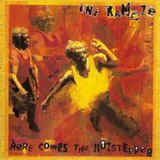 |
Here Comes The
Hotstepper - Ini Kamoze
4 weeks No.1
between
week 6, 1995 and
week 9, 1995 Label: Columbia - Writers: Ini Kamoze, Chris Kenner, Kenton Nix, Salaam Remi - Producer: Salaam Remi "Here Comes The Hotstepper" was released on August 18, 1994, as the lead single from Kamoze's album of the same name as well as the soundtrack to the film Prêt-Á-Porter. It's known for its "naaaa na na na naaa..." chorus inspired by the Cannibal And The Headhunters version of Land Of 1000 Dances. The song's instrumental samples the drums and bass from "Heartbeat" by Taana Gardner and guitar notes from "Hung Up On My Baby" by Isaac Hayes. It went atop the hitlists in the United States, Denmark, New Zealand, and furthermore to the Top 10 in United Kingdom, Germany, France, Australia, Spain, Belgium, Switzerland, Austria, Finland, Sweden, and Norway. |
 |
Take A Bow -
Madonna
6 weeks No.1
between
week 10, 1995 and
week 15, 1995 Labels: Maverick / Sire - Writers: Madonna, Kenneth Edmonds - Producers: Madonna, Babyface "Take A Bow", released on December 6, 1994, is the second single from Madonna's sixth studio album Bedtime Stories (1994). Following the sexually explicit persona portrayed by Madonna on her previous album, Erotica, she wanted to tone down her image for Bedtime Stories. Experimenting with a new musical direction and a more radio-friendly sound, Madonna decided to collaborate with Babyface, whose work with other musicians had impressed her. The pop-ballad developed after she listened to the basic beat and chords of a piece of music composed by him. "Take A Bow" lyrically talks about unrequited love and Madonna saying goodbye. The song topped the national hitlists in the United States and Canada. |
 |
Back For Good -
Take That
3 weeks No.1
between
week 16, 1995 and
week 18, 1995 Labels: RCA / Arista - Writer: Gary Barlow - Producers: Chris Porter, Gary Barlow "Back For Good" was released on March 27, 1995, as the second single from the band's third studio effort Nobody Else (1994). The fantastic blue-eyed soul ballad won British Single Of The Year at the 1996 Brit Awards. Gary Barlow claimed he wrote the song in only fifteen minutes. However, "Back For Good" catapulted atop the hitlist in United Kingdom with nearly 350,000 single sales in its initial week, so this made it one of the fastest selling singles of the year there. Furthermore the song went to the summit in Germany, Canada, Australia, Spain, Norway, Ireland, and reached the Top 10 in many other countries, even in the United States. |
 |
Have You Ever
Really Loved A Woman? - Bryan Adams
11 weeks No.1
between
week 19, 1995 and
week 29, 1995 Label: A&M - Writers: Bryan Adams, Michael Kamen, Robert 'Mutt' Lange - Producers: Bryan Adams, Robert 'Mutt' Lange "Have You Ever Really Loved A Woman?", released on April 14, 1995, was written for the movie Don Juan DeMarco. The melody is used as a musical motif throughout the movie, and the song is featured three times in the movie, twice performed by other artists in Spanish, and finally performed by Adams himself during the closing credits. The Adams version of the song, which features flamenco guitarist Paco De Lucia, is featured on the soundtrack album and also on Adams' seventh studio album '18 Til I Die' (1996). "Have You Ever Really Loved A Woman?" was a huge airplay hit globally. Furthermore it landed in the Top 10 of almost all countries around the globe, in the United States, Canada, Australia, and Switzerland even at no.1. On the Countdown Chart 1995 the song landed at the runner-up slot. |
 |
Shy Guy - Diana
King
4 weeks No.1
between
week 30, 1995 and
week 33, 1995 Label: Work - Writers: Diana King, Andy Marvel, Kingsley Gardner - Producer: Andy Marvel The Reggae fusion / dancehall smash "Shy Guy" was released on March 14, 1995, as lead single for the movie soundtrack Bad Boys. It also appeared on King's debut studio album, Thougher Than Love (1995). The song contains a sample from the 1975 "School Boy Crush" by Average White Band. "Shy Guy" topped the charts in Sweden and Finland and became a top-five hit in several other countries, including France, Australia, the Netherlands, Norway, New Zealand and Ireland. |
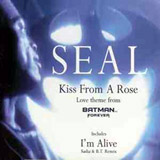 |
Kiss From A Rose
- Seal
1 week No.1
week
34, 1995 Labels: ZTT / Sire - Writer: Henry Samuel - Producer: Trevor Horn "Kiss From A Rose" was originally written in 1987 by Seal, but only a few years later released as part of his second eponymous album (1994), and included in the film The Never Ending Story III that year. It was re-released a year later in 1995 as part of the Batman Forever film soundtrack, helping the soul / baroque pop song to become a worldwide success. "Kiss From A Rose" reached the pole position in the United States and Australia, and the Top 3 in Canada, the Netherlands, Norway, and Austria. At the 1996 Grammy Awards, it won awards for Record Of The Year, Song Of The Year, and Best Male Pop Vocal Performance. |
 |
You Are Not Alone
- Michael Jackson
7 weeks No.1
between
week 35, 1995 and
week 41, 1995 Label: Epic - Writer: R.Kelly - Producers: R.Kelly, Michael Jackson "You Are Not Alone" was released on August 15, 1995, as second lift-off from Jackson's greatest hits compilation HIStory: Past, Present & Future, Book I (1995). The R&B ballad was written by fellow American singer / songwriter R.Kelly for Jackson in response to difficult times in his own personal life. Kelly sent a demo tape to Jackson, who liked the song and decided to produce it with him in his Chicago studio. Jackson's interest in the song was also linked to events in his personal life. "You Are Not Alone" topped the hitlists in the United States, United Kingdom, France, Spain, Belgium, Switzerland, Austria, New Zealand, and Ireland. |
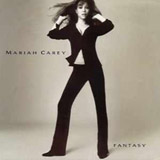 |
Fantasy
- Mariah Carey
1 week No.1
week
42, 1995 Label: Columbia - Writers: Mariah Carey, Dave Hall, Macauley Green, Adrian Belew, Chris Frantz, Steven Stanley, Tina Weymouth - Producers: Mariah Carey, Dave Hall "Fantasy" was released on August 23, 1995, as the lead single from her fifth album, Daydream (1995). The good mood tune samples Tom Tom Club's 1981 song "Genius Of Love". The lyrics describe a woman who is in love with a man, and how every time she sees him she starts fantasizing about an impossible relationship with him. "Fantasy" exemplified how a music sample could be transformed into a fully realized pop masterpiece. Due to the success and influence of the song, Carey is credited for introducing R&B and hip hop collaboration into mainstream pop culture, and for popularizing rap as a feature act. The song topped the hitlists in the United States, Canada, and Australia. |
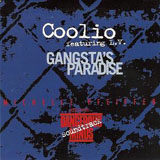 |
Gangsta's
Paradise - Coolio feat. L.V.
13 weeks No.1
between
week 43, 1995 and
week 3, 1996 Label: MCA - Writers: Artis Ivey Jr., Larry Sanders, Doug Rasheed, Stevie Wonder - Producer: Doug Rasheed The ingenious gangsta-rap / G-funk track "Gangsta's Paradise" from Coolio's second album with the same name, was released on August 1, 1995. Interpolating Stevie Wonder's song "Pastime Paradise" (from his famous 1976 album Songs In The Key Of Life) "Gangsta's Paradise" became the biggest global hit of the year 1995. The song begins with a line from Psalm 23:4: "As I walk through the valley of the shadow of death", but then diverges with: "I take a look at my life and realize there's nothing left." Adding to some of the religious overtones are choral vocals in the background. Coolio freestyled the first couple of lines, with the rest of the lyrics coming to him quickly in the background. The chorus of the song "Been spending most their lives living in a gangsta's paradise," was created by American singer Larry J.Sanders, known professionally as L.V., by stacking the vocals many times to make it sound like a choir. The accompanying music video for the song was directed by Antoine Fuqua and featured Michelle Pfeiffer reprising her earlier role in Dangerous Minds. "Gangsta's Paradise" was a no.1 hit in almost all territories around the world and won a Grammy Award for Best Rap Solo Performance. |
1996
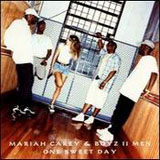 |
One Sweet Day
- Mariah Carey & Boyz II Men
5 weeks No.1
between
week 4, 1996 and
week 9, 1996 Label: Columbia - Writers: Mariah Carey, Walter Afanasieff, Nathan Morris, Michael McCary, Shawn Stockman, Wanya Morris - Producers: Mariah Carey, Walter Afanasieff "One Sweet Day" was released on November 14, 1995, as the second single from Mariah's fifth album, Daydream (1995). After her friend and past collaborator David Cole (of C&C Music Factory) died, she began writing and developing a song that would pay homage to him and all the friends and family her fans had lost along life's journey. Carey had the idea and chorus composed, and after meeting with Boyz II Men, they realized they too had a similar idea in development. Then Carey began to incorporate other lyrics into the chorus, trying to make the song relatable to the AIDS epidemic that was in full force in the mid-1990s. "One Sweet Day" started at no.1 on the official Billboard Hot 100 chart in the United States and remained there for 16 consecutive weeks. Furthermore topped the R&B ballad the hitlists in Canada and New Zealand. |
 |
Namonaki-Uta
- Mr.Children
1 week No.1
week
8, 1996 Label: Toy's Factory Japan - Writer: Kazutoshi Sakurai - Producer: Takeshi Kobayashi "Namonaki-Uta" is the tenth single by the Japanese pop rock band Mr.Children. It was used as the theme song of Japanese television drama Pure. Released on February 5, 1996, it opened with massive sales of 1,21 million copies in the initial week. According to Oricon "Namonaki-Uta" was the biggest hit of the year 1996 in Japan with a total of 2,31 million singles sold. |
 |
Missing
- Everything But The Girl
3 weeks No.1
between
week 10, 1996 and
week 12, 1996 Labels: Blanco Y Negro / Atlantic - Writers: Tracey Thorn, Ben Watt - Producers: Ben Watt, John Coxon, Todd Terry "Missing" is taken from the band's eighth studio album Amplified Heart (1994). It was written by the two band members, Tracey Thorn and Ben Watt. Released on August 8, 1994, it initially did not achieve much success until it was remixed by Todd Terry and re-released in 1995, resulting in worldwide success. "Missing" topped the hitlists in Germany, Canada, Italy, Denmark, Hungary, and reached furthermore the top three in the United States, United Kingdom, France, Australia, Belgium, the Netherlands, Sweden, Switzerland, and Ireland. |
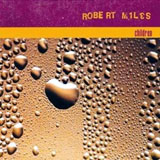 |
Children
- Robert Miles
7 weeks No.1
between
week 13, 1996 and
week 19, 1996 Labels: Deconstruction / DBX - Writer: Roberto Concina - Producer: Robert Miles "Children" is one of the pioneering tracks of Dream house, a genre of electronic dance music characterized by dream-like piano melodies, and a steady four-on-the-floor bass drum. Robert Miles gave two inspirations for the writing of the famous instrumental track. One was as a response to photographs of child Yugoslav war victims that his father had brought home from a humanitarian mission in the former Yugoslavia, and the other, inspired by his career as a disc jockey, was to create a track to end DJ sets, intended to calm rave attendants prior to their driving home as a means to reduce car accident deaths. "Children" cost only £150 to record. Released in November 1995 as the lead single from Miles' debut album Dreamland (1996), it went to the top position in Germany, France, Italy, Spain, Belgium, Switzerland, Austria, Sweden, Norway, Denmark, amd Finland. |
 |
Fastlove
- George Michael
6 weeks No.1
between
week 20, 1996 and
week 25, 1996 Labels: DreamWorks / Virgin - Writers: George Michael, Patrice Rushen, Freddie Washington, Terri McFaddin - Producers: George Michael, Joe Douglas "Fastlove" was released on April 22, 1996, as the second single from his third solo album, Older (1996). The song interpolates Patrice Rushen's 1982 single "Forget Me Nots". Michael's initial consept of the song was built on a laid-back latin / bossa nova rhythm. When Douglas was brought on as producer, the demo backing track was scrapped; Douglas created a new musical arrangement whilst retaining Michael's original vocal performance and the saxophone part played by Andy Hamilton. The "Forget Me Nots" sample was change that Michael added at the last minute, as he wanted to change the end of the song. Douglas didn't like the idea at first, and before working to the transition, he listened to the song over and over for two weeks to work on the transition at the end of the song. "Fastlove" topped the charts in United Kingdom, Australia, Italy, and Spain. |
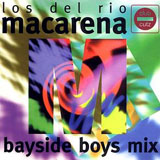 |
Macarena - Los
Del Rio
17 weeks No.1
between
week 26, 1996 and
week 43, 1996 Label: RCA - Writers: Rafael Ruiz Perdigones, Antonio Romero Monge - Producer: Los Del Rio "Macarena" was originally recorded for the Spanish duo's 1993 album A Mí Me Gusta. A dance remix by the electropop group Fangoria was a success in Spain, and a soundalike cover version by Los Del Mar became popular in Canada. Another remix by Miami-based producers the Bayside Boys, who added a section with English lyrics and expanded its popularity, initially peaked at no.45 on the US Billboard Hot 100 in late 1995. This remix enjoyed a sgnificant revival the following year, its resurgence was aided by a dance craze that became a cultural phenomenon. However, "Macarena" was the biggest smash-hit of the year 1996 globally and reached the top positions on the hitlists in almost all countries around the world. |
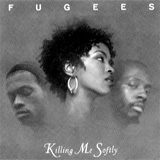 |
Killing Me Softly
- Fugees
1 week No.1
week
29, 1996 Labels: Ruffhouse / Columbia - Writers: Charles Fox, Norman Gimbel, Lori Lieberman - Producer: Fugees "Killing Me Softly" was originally composed in 1971 by Charlie Fox with lyrics by Norman Gimbel in collaboration with Lori Lieberman after she was inspired by a Don McLean concert. In 1973, it became a number-one smash on the Global Chart for Roberta Flack. American hip hop group Fugees released their version of the song on May 27, 1996, on their second album The Score (1996). This remix features percussive rhythms with a synth sitar sound, Wyclef Jean's blurted chants, Lauryn Hill's vocal melisma on the scattled bridge, and a bombastic drum-loop track. The Fugees' version reached the runner-up slot on the Global Year-End Chart 1996 and landed at no.1 in almost all countries around the planet. Furthermore it won the 1997 Grammy Award for Best R&B Performance By A Duo Or Group. |
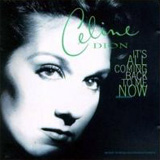 |
It's All Coming
Back To Me Now
- Celine Dion
1 week No.1
week 44, 1996 Label: Columbia - Writer: Jim Steinman - Producers: Jim Steinman, Steven Rinkoff, Roy Bittan "It's All Coming Back To Me Now" is a power ballad written by Jim Steinman. According to Steinman, the song was inspired by Emily Brontë's novel Wuthering Heights, and was an attempt to write the most passionate, romantic song he could ever create. Meat Loaf had wanted to record the song for years, but Steinman saw it as a woman's song. Steinman won a court case, which prevented Meat Loaf from recording it. Girl group Pandora's Box went on to record it, and it was subsequently made famous through a cover by Celine Dion, which upset Meat Loaf because he was going to use it for a planned album with the working title Bat Out Of Hell III. Celine Dion's version was released on July 30, 1996, and it's the first track on her fourth English-language studio album, Falling Into You (1996). The song reached no.1 in Canada, furthermore the Top 10 in the United States, United Kingdom, Australia, Belgium, the Netherlands, New Zealand, and Ireland. |
 |
I Love You Always
Forever - Donna Lewis
2 weeks No.1
between
week 45, 1996 and
week 46, 1996 Label: Atlantic - Writer: Donna Lewis - Producers: Donna Lewis, Kevin Killen "I Love You Always Forever", released on April 16, 1996, is the debut single by Welsh singer Donna Lewis from her album, Now In A Minute (1996). Inspired by the novel Love For Lydia by English author H.E.Bates, "I Love You Always Forever" is a pop song in which the singer declares her endless love for her significant other. The song was originally titled "Lydia", but was later changed because there was no mention of anyone with that name in the song. The chorus, "I love you always forever, near and far closer together", is a quote taken directly from the book. The song went to the runner-up slot in the United States and Australia, and at no.3 in Canada, Austria, Norway, and Ireland. |
 |
Un-Break My Heart
- Toni Braxton
14 weeks No.1
between
week 47, 1996 and
week 8, 1997 Labels: LaFace / Arista - Writer: Diane Warren - Producer: David Foster "Un-Break My Heart" was released on October 7, 1996, as the second single from Toni's second studio album, Secrets (1996). The song is an ingenious ballad about a blistering heartbreak in which the singer begs a former lover to return and undo the pain he has caused. Diane Warren wrote the song in 1995. When asked about her songwriting process, she said that songs usually come to her from a title, a chorus, or a drum beat. "Un-Break My Heart" was conceived from its title, and, according to Warren, "it popped into my head, and i thought, 'I don't think I've heard that before, that's kind of interesting.' I started playing around on the piano with these chords and did a key change, and then i knew, 'Okay, this i magic.'" Bille Woodruff directed the accompanying video for the single. It portrays Braxton mourning the death of her lover (played by model Tyson Beckford), while remembering the good times they had together. "Un-Break My Heart" landed at no.3 on the Global Year Chart 1997 and in the same year it won a Grammy Award for Best Female Pop Vocal Performance. It went to no.1 in the United States, Belgium, Sweden, Switzerland, Austria and climbed in the Top 10 in many other countries. |
1997
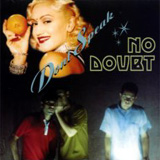 |
Don't Speak - No Doubt
7 weeks No.1
between
week
9, 1997 and
week
15, 1997 Label: Interscope - Writers: Eric Stefani, Gwen Stefani - Producer: Matthew Wilder "Don't Speak" was released on April 15, 1996 as the third single from the band's third studio album Tragic Kingdom. Vocalist Gwen Stefani wrote the song with her brother Eric Stefani about her bandmate and ex-boyfriend Tony Kanal shortly after he ended their seven-year relationship. Despite the song's popularity, it did not chart on the Billboard Hot 100 as rules of the times required commercial singles for charting and one was not issued for the song, but it did reach number one on the Billboard Hot 100 Airplay for 16 weeks. In the rest of the world "Don't Speak" reached top positions in many countries, so it was no.1 in United Kingdom, Canada, Australia, the Netherlands, Belgium, Sweden, Norway, Denmark, Switzerland, Austria, New Zealand, Ireland, and Hungary. |
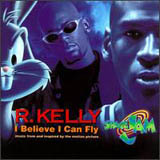 |
I Believe I Can
Fly - R.Kelly
6 weeks No.1
between
week
16, 1997 and
week
21, 1997 Labels: Warner Sunset / Atlantic / Jive - Writer: Robert Kelly - Producer: R.Kelly "I Believe I Can Fly", written for the soundtrack to the 1996 film Space Jam, was originally released on November 26, 1996, and was later included on Kelly's 1998 album R. In the United States the song reached number two on the Billboard Hot 100. Although Kelly has had two number songs there, "I Believe I Can Fly" is his most successful single. In United Kingdom, Italy, the Netherlands, Austria, Switzerland, New Zealand, and Ireland it went to no.1. The powerful soul / gospel ballad won three Grammy Awards, for the best R&B song, the best male R&B vocal performance and the best song written specifically for a motion picture. |
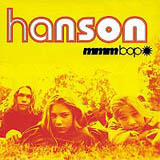 |
Mmm Bop -
Hanson
5 weeks No.1
between
week
22, 1997 and
week
26, 1997 Label: Mercury - Writers: Isaac Hanson, Taylor Hanson, Zac Hanson - Producers: Dust Brothers, Stephen Lironi "Mmm Bop", released on April 15, 1997, was the lead single from the brother trio's debut full length studio album Middle In Nowhere (1997). Originally appeared as a ballad one year ago, it was reworked as an upbeat pop track by hit producers The Dust Brothers. This became the hit version. "Mmm Bop" peaked on many national hitlists: in the United States, United Kingdom, Germany, Canada, Australia, Belgium, Austria, Spain, Sweden, New Zealand, and Ireland. |
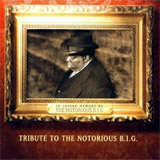 |
I'll Be Missing
You -
Puff Daddy & Faith Evans feat. 112
12 weeks No.1
between
week
27, 1997 and
week
38, 1997 Labels: Bad Boy / Arista - Writers: Sting, Todd Gaither, Faith Evans - Producers: Puff Daddy, Stevie J "I'll Be Missing You" was created in memory of fellow Bad Boy Records artist and Faith Evans' husband Christopher 'The Notorious B.I.G.', who was murdered on March 9, 1997. The song is based on a sample of the Police's 1983 no.1 smash "Every Breath You Take". It also uses an interpolation of the "Every Breath You Take" melody, sung by Faith Evans. It also interpolates the 1929 Albert E.Brumley hymn "I'll Fly Away" and features a spoken intro over a choral version of Samuel Barber's "Adagio For Strings" from 1936. "I'll Be Missing You" was released on May 27, 1997, as the second single from Puff Daddy & The Family's debut album, No Way Out (1997). It became a huge success worldwide, with no.1 positions in many countries, for example in the United States, United Kingdom, Germany, Australia, Spain, the Netherlands, and other. On the Year-End Chart 1997 "I'll Be Missing You" ranked at no.2 with a total of 11,865,000 points. And the song won a Grammy Award for Best Rap Performance by a Duo or Group. |
 |
Candle In The
Wind 1997 -
Elton John
15 weeks No.1
between
week
39, 1997 and
week
1, 1998 Label: Rocket - Writers: Elton John, Bernie Taupin - Producer: George Martin "Candle In The Wind 1997" was released on September 13, 1997. Preceded was, one week earlier, the sumptous funeral of the royal icon Diana Frances Spencer, the Princess of Wales. She been killed by a car accident, at the age of only 36 years. As the highlight of the funeral celebration, which attracted at TV more tha a billion people worldwide, Elton John sang his "Candle In The Wind 1997" as a kind of necrology - with tremendous consequences: the song wrote chart history. It's the most successful single of all time. In nearly every country it effortlessly breaks the historic sales record brands. For example in United Kingdom with 4,93 million singles sales or in Germany with 4,75 million sold. In the United States, where the song was released nine days late, it started with whopping 3,5 million sales in its initial week and was certified with a diamond certification (10 million shipments) some times later. On the Global Chart 'Candle In The Wind 1997' made a deep impact in the week 39 with 1,4 million points, based on the sales of only one day! The following two weeks the song peaked with 3,3 million, respectively 5,1 million points... a historic record! |
1998
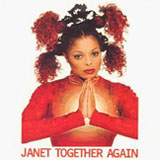 |
Together Again - Janet Jackson
7 weeks No.1
between
week
2, 1998 and
week
8, 1998 Label: Virgin - Writers: Janet Jackson, James Harris III, Terry Lewis, René Elizondo Jr. - Producers: Jimmy Jam & Terry Lewis, Janet Jackson "Together Again" was released on December 2, 1997 and taken as the second single from her sixth album The Velvet Rope (1997). Originally written as a ballad, the track was rearranged as an uptempo dance song. Jackson was inspired to write the song by her own personal experience of losing a friend to AIDS, as well as by a piece of fan mail she received from a young boy in United Kingdom who had lost his father. "Together Again" reached no.1 in the United States and the Netherlands, no.2 in Germany, France, Canada, Belgium, and Switzerland, no.4 in United Kingdom, and no.5 in Japan. |
 |
My Heart Will Go On - Celine Dion
16 weeks No.1
between
week
9, 1998 and
week
24, 1998 Labels: 550 Music / Columbia - Writers: James Horner, Will Jennings - Producers: Walter Afanasieff, James Horner, Simon Franglen The basis of "My Heart Will Go On" composed James Horner as a motif used in the soundtrack to the romantic disaster film Titanic, and suggested developing it into a song. Film director James Cameron felt a pop song would be inappropriate for the film, but agreed after hearing the demo. The final version was arranged by Walter Afanasieff. The song was originally intended for the Norwegian singer Sissel Kyrkjebø. Simon Franglen, who was working with Horner on electronic textures and synthesizers for the film score, suggested Celine Dion, with whom he had worked on many of her hits. "My Heart Will Go On" was released on November 24, 1997, and was included on Dion's fifth English-language album, Let's Talk About Love, and the Titanic soundtrack (both from 1997). Parallel to the immense success of the film, the song was also a huge success worldwide, with no.1 placements in almost all countries around the globe. "My Heart Will Go On" was the biggest hit of the year 1998 with a total of 13,398,000 points. It dominated the 1999 Grammy Awards, winning Record Of The Year, Song Of The Year, best Female Pop Vocal Performance, and Best Motion Picture Song. |
 |
The Boy Is Mine - Brandy & Monica
11 weeks No.1
between
week
25, 1998 and
week
35, 1998 Label: Atlantic - Writers: LaShawn Daniels, Rodney Jerkins, Fred Jerkins III, Japhne Tejeda, Brandy Norwood - Producers: Darkchild, Brandy, Dallas Austin "The Boy Is Mine" was released on May 4, 1998, as the lead single from both singers' second albums from 1998, Never Say Never by Brandy and the album of the same name by Monica. Inspired by Michael Jackson and Paul McCartney's 1982 nummber one duet "The Girl Is Mine", the lyrics of the mid-tempo R&B track revolve around two women fighting over a man. "The Boy Is Mine" went to the top position in the United States, Canada, the Netherlands, New Zealand, furthermore to the runner-up slot in United Kingdom, France, Belgium, Norway, Ireland, and it landed at no.2 on the Global Year-End Chart 1998 with a total of 7,945,000 points. |
 |
I Don't Want To Miss A Thing - Aerosmith
11 weeks No.1
between
week
36, 1998 and
week
46, 1998 Label: Columbia - Writer: Diane Warren - Producer: Matt Serletic "I Don't Want To Miss A Thing" was released on August 18, 1998 for the soundtrack to the science fiction disaster film "Armageddon", starring Bruce Willis, Billy Bob Thornton, Liv Tyler, and Ben Affleck. The power ballad was the biggest hit in the career of Aerosmith and their only global no.1 smash. "I Don't Want To Miss A Thing" held the top slot of the Global Charts for eleven weeks and reached no.3 on the Year-end Chart 1988. On the national charts the song went to no.1 in the United States, Germany, Australia, Italy, Norway, Austria, Switzerland, and Ireland. |
 |
Crush - Jennifer Paige
2 weeks No.1
between
week
47, 1998 and
week
48, 1998 Labels: Hollywood / Edel - Writers: Andy Goldmark, Mark Mueller, Berny Cosgrove, Kevin Clark - Producers: Andy Goldmark, Jimmy Bralower "Crush" was released on June 16, 1998 as the first single from Jennifer Paige's self-titled debut album. The song was inspired by Jennifer's personal experiences and observations in her love life. In April 1998, soon after Paige recorded "Crush", producer Andy Goldmark played the song at Los Angeles radio station KIIS-FM, where it met with a hugely positive reaction from programmers and was added to the station's playlist within days. So it began its meteoric rise up in the charts, without typical record company promotion or release. Finally "Crush" went to no.1 in Canada, Australia and New Zealand, no.3 in the United States and Italy, and no.4 in France and United Kingdom. |
 |
Believe - Cher
13 weeks No.1
between
week
49, 1998 and
week
8, 1999 Label: Warner Bros. - Writers: Brian Higgins, Stuart McLennen, Paul Barry, Steven Torch, Matthew Gray, Timothy Powell, Cher - Producers: Mark Taylor, Brian Rawling "Believe", released on October 19, 1998, was the lead single from Cher's twenty-second album with the same name. The song departed from Cher's pop-rock style of the time for an upbeat dance-pop style. It featured a pioneering use of the audio processor software Auto-Tune as a vocal effect, which became known as the 'Cher effect'. The lyrics describe empowerment and self-sufficiency after a painful breakup. The song contains samples of "Prologue" & "Epilogue", performed by Electric Light Orchestra. "Believe" was the biggest hit of the year 1999 and reached no.1 in many countries, among others in the United States, United Kingdom, Germany, France, Canada, Australia, Netherlands, Belgium, Switzerland, Sweden, Norway, Denmark, and Spain. |
1999
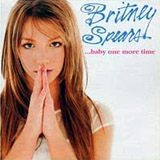 |
Baby One More Time - Britney Spears
8 weeks No.1
between
week
9, 1999 and
week
17, 1999 Label: Jive - Writer: Max Martin - Producers: Max Martin, Rami "Baby One More Time" is the debut single by Britney Spears from her debut studio album of the same title (1999) and was released on September 29, 1998. The song was originally written by Swedish producer legend Max Martin for the Backstreet Boys and TLC, but they both rejected it. That's how the track ended up with Britney Spears. Later she said: "I felt excited when i heard it and knew it was going to be a hit record". And she was right, "Baby One More Time" became a huge success worldwide and Britney Spears a celebrated teen idol. An accompanying music video, directed by Nigel Dick, features Spears as a high-school student who starts to sing and dance around the school, while watching her love interest from afar. "Baby One More Time" went to the top position in almost all countries around the globe and reached the runner-up slot on the Year-End Chart 1999 with 8,918,000 points. |
 |
Dango 3 Kyodai -
Dango Gasshodan & Co.
1 week No.1
week 11, 1999 Label: Pony Canyon - Writer: Jim Steinman - Producers: Jim Steinman, Steven Rinkoff, Roy Bittan "Dango 3 Kyodai" (means "Three Dango Brothers") caused a social phenomenon in Japan. The title is a play on words that alludes to the musical style tango. Released on March 3, 1999, the song debuted with sales of over one million copies in its initial week, according to Oricon. In the end, the sales added up to nearly three million, becoming the third best-selling single in Japan at that time. |
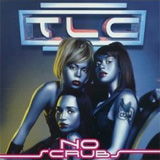 |
No Scrubs - TLC
5 weeks No.1
between
week
18, 1999 and
week
22, 1999 Labels: Laface / Arista - Writers: Kevin 'She'kspere' Briggs, Kandi Burruss, Tameka 'Tiny' Cottle, Lisa Lopes - Producer: She'kspere "No Scrubs" was released on February 2, 1999, as the lead single from TLC's third studio album, FanMail (1999). The R&B / hip-pop song, containing a prominent Kurzweil Acoustic Guitar beat. It has airy remnants of an electronic guitar, followed by Rozonda 'Chilli' Thomas' vocals. The lyrics describe the role of a man in a relationship. The word 'scrub' was used in some regions of the United States as a slang term for an unsuccessful person of low social status. With the success of the song, the word became prominently used worldwide. "No Scrubs" jumped atop the hitlists in the United States, Canada, Australia, and Ireland. |
 |
I Want It That Way - Backstreet Boys
4 weeks No.1
between
week
23, 1999 and
week
28, 1999 Label: Jive - Writers: Andreas Carlsson, Max Martin - Producers: Kristian Lundin, Max Martin "I Want It That Way", released on April 12, 1999, is the lead single from the group's third studio album Millennium (1999). The pop ballad tells a romantic relationship strained by matters of emotional or physical distance. Originally, "Larger Than Life" was intended to be the lead single, following the similar formula of their first two albums, having an upbeat lead single. However, after hearing the final version of "I Want It That Way", the group wanted to move in a more mature direction, by utilizing a mid-tempo track as the lead single. The song reached number one in United Kingdom, Germany, Italy, Spain, the Netherlands, Switzerland, Austria, Norway, Greece, and New Zealand. |
 |
Livin' La Vida Loca - Ricky Martin
3 weeks No.1
between
week
24, 1999 and
week
29, 1999 Label: C2 - Writers: Draco Rosa, Desmond Child - Producer: Desmond Child "Livin' La Vida Loca" was released on March 27, 1999, as the lead single from Ricky Martin's fifth and self-titled studio album (1999). It's a furious and rousing latin smash with elements of salsa, surf, and ska, that features Latin percussion rhythms and horn riffs mixed with surf rock-inspired guitar riffs. Lyrically is about an irresistible, particularly sinister, wild woman who lives on the edge, seducing others into her crazy world. The accompanying music video was filmed in Los Angeles, California, directed by Wayne Isham and cost US $500,000 making it one of the most expensive music videos ever until that time. "Livin' La Vida Loca" rockets atop the hitlists in the United States, United Kingdom, Canada, Ireland, and New Zealand. |
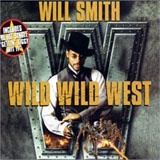 |
Wild Wild West - Will Smith, Dru Hill & Kool Mo Dee
2 weeks No.1
between
week
30, 1999 and
week
31, 1999 Label: Columbia - Writers: Kool Mo Dee, Rob Fusari, Will Smith, Stevie Wonder - Producers: Rob Fusari, Mark Wilson "Wild Wild West" is the theme from the 1999 film of the same name, in which he also starred. The song plays during the film's closing credits. It samples Stevie Wonder's 1976 hit "I Wish" and includes parts of the chorus from Kool Mo Dee's song of the same name. Released on May 11, 1999, as a single from the film's soundtrack and as the lead single from Smith's second studio album, Willennium (1999), it reached the top position in the United States, and the Top 10 in many other countries. |
 |
If You Had My Love - Jennifer Lopez
4 weeks No.1
between
week
32, 1999 and
week
35, 1999 Labels: Work / Columbia - Writers: Rodney Jerkins, LaShawn Daniels, Cory Rooney, Jennifer Lopez, Fred Jerkins III - Producer: Rodney Jerkins "If You Had My Love", released on May 4, 1999, is the debut single by American actress and singer Jennifer Lopez from her debut studio album, On The 6 (1999). The midtempo pop and R&B song, it features Latin music and hip hop influences, with lyrics revolving around the beginning of a new relationship, during which Lopez confronts her admirer with a number of ground rules. The accompanying music video, directed by Paul Hunter, features a voyeuristic internet concept, wherein Lopez' spectators are able to direct her through cyberspace. "If You Had My Love" went to no.1 in the United States, Canada, Australia, the Netherlands, Finland, Greece, and New Zealand. |
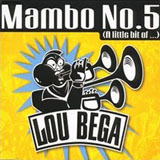 |
Mambo No.5 - Lou Bega
6 weeks No.1
between
week
36, 1999 and
week
41, 1999 Label: RCA - Writers: Lou Bega, Dámaso Pérez Prado, Zippy Davids - Producers: Goar B, Frank Lio, Donald Fact, Peter Meisel "Mambo No.5" was originally composed and recorded as an instrumental mambo and jazz dance song by Cuban musician Dámaso Pérez Prado in 1949. Half a century later German singer Lou Bega sampled the original for a new song released under the same name on his 1999 debut album, A Little Bit Of Mambo. The exuberant smash peaked at no.3 in the United States and went to the top position in almost all other countries around the world. On the Year-End Chart 1999 it placed at no.3 with 8,262,000 points. "Mambo No.5" became the subject of a seven-year copyright trial between Prado's estate, the music publisher Peermusic, and Bega's producers. Because of Bega's significant contributions to his version, the court's final ruling declared it a new song co-written by Prado and Bega. |
 |
Genie In A Bottle - Christina Aguilera
6 weeks No.1
between
week
42, 1999 and
week
48, 1999 Label: RCA - Writers: David Frank, Steve Kipner, Pamela Sheyne - Producers: David Frank, Steve Kipner Released on May 11, 1999, "Genie In A Bottle" is the debut single by Christina Aguilera and taken from her self-titled album (1999). It uses sexual references to address the themes of self-respect and abstinence. The demo track that the record company had heard was used as a basis for Aguilera's actual recording, as she only replaced the vocals on the demo with her own before the writers and producers edited it for improvement. However, after the first recording was completed they felt her vocals were too hard sounding; a second proved to deliver the softer quality they were after. "Genie In A Bottle" topped the hitlists in the United States, United Kingdom, Spain, Belgium, Austria, Norway, and Denmark, furthermore it reached the runner-up slot in Germany, Canada, Australia, Italy, Switzerland, Ireland, and New Zealand. |
 |
Addicted To You -
Hikaru Utada
1 week No.1
week 47, 1999 Label: Toshiba EMI Japan - Writer: Hikaru Utada - Producers: Jimmy Jam, Terry Lewis "Addicted To You" was released on November 10, 1999, as the lead single from Hikaru Utada's second album Distance (2001). EMI did not originally select "Addicted To You" as the lead single as they feared it would not make an impact in Japan. The song was then re-composed in order to appeal more to the Japanese audience. In the first week after its release the song sold over one million units, according to Oricon. |
 |
(You Drive Me)
Crazy - Britney Spears
1 week No.1
week 49, 1999 Label: Jive - Writers: Jörgen Elofsson, Per Magnusson, David Kreuger, Max Martin - Producers: David Kreuger, Per Magnusson, Max Martin, Rami "(You Drive Me) Crazy" was released on November 24, 1999, as the third single from the album Baby One More Time (1999). It was featured on the soundtrack of the 1999 teen romantic comedy film 'Drive Me Crazy'. The song's composition follows a simple formula and infuses drums, guitar, and edgy synthesized instruments, including a recurring cowbell. "(You Drive Me) Crazy" wents to the Top 10 in many countries, like the United States, United Kingdom, Germany, France, Canada, Italy, Sweden, Norway and others. |
 |
Waiting For Tonight - Jennifer Lopez
2 weeks No.1
between
week
50, 1999 and
week
51, 1999 Labels: Work / Columbia - Writers: Maria Christensen, Michael Garvin, Phil Temple - Producers: Ric Wake, Richie Jones "Waiting For Tonight" was originally recorded by Maria Christensen's girl group 3rd Party for their debut studio album, Alive (1997). Two years after the group disbanded, Jennifer Lopez recorded her own version of the song for the debut studio album, On The 6 (1999). Released on September 7, 1999, the song reached the Top 10 in the United States, United Kingdom, France, Canada, Australia, Italy, Spain, Belgium, the Netherlands, Finland, Denmark, and New Zealand. |
 |
That's The Way It Is - Celine Dion
8 weeks No.1
between
week
52, 1999 and
week
7, 2000 Labels: Epic / Columbia - Writers: Max Martin, Kristian Lundin, Andreas Carlsson - Producers: Max Martin, Kristian Lundin "That's The Way It Is" is the lead single from Celine Dion's compilation 'All The Way...A Decade Of Song', released on November 1, 1999. It's an uptempo number, a joyful ode to holding the faith but allowing love to take its course when it's ready. "That's The Way It Is" was Celine's third global number one success and especially a huge airplay smash around the world. On the sales charts it reached no.12 in United Kingdom, no.8 in Germany, Austria and Spain, no.7 in the Netherlands and New Zealand, no.6 in France, no.3 in Italy and Norway, and no.2 in Sweden. |